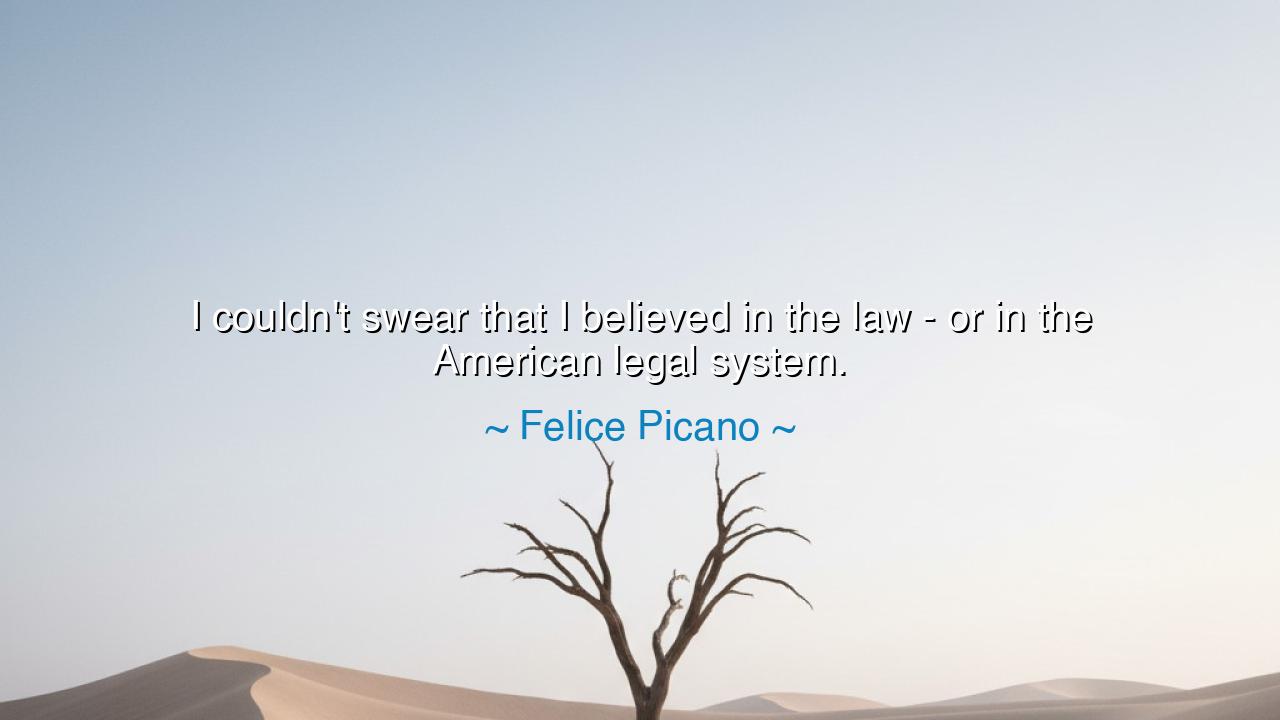
I couldn't swear that I believed in the law - or in the American






In the chronicles of human society, the law has always been both a guiding star and a source of doubt. Felice Picano’s words, “I couldn't swear that I believed in the law - or in the American legal system,” speak to a profound tension between principle and practice, ideal and reality. Here lies a meditation on justice, disillusionment, and the fragility of trust in the institutions that govern society, reminding us that the legitimacy of law depends not only on its codification but on its equitable application and moral authority.
From the city-states of Athens to the courts of Rome, philosophers and citizens alike grappled with the limits of legal systems. Plato warned that laws alone could not ensure justice if they were not infused with wisdom and virtue. Similarly, Picano’s reflection underscores a modern challenge: when laws fail to uphold fairness, or when the legal system discriminates, protects the powerful, or ignores the marginalized, belief in its moral authority falters.
History provides vivid illustration. In 1950s and 1960s America, African Americans faced a legal system that sanctioned segregation, denied voting rights, and enforced inequality under the guise of legality. Many could not swear belief in the law as just, despite its codification. Yet, persistent activism, civil disobedience, and judicial challenges gradually reshaped the system to align more closely with principles of equality. Picano’s doubt echoes this historical tension between law as written and law as justly applied.
Consider a personal example: an LGBTQ+ individual in the 1970s, living under statutes that criminalized same-sex relationships, would naturally struggle to believe in a system that codified discrimination. Felice Picano, as a gay writer and activist, witnessed firsthand how law could fail those it was meant to protect. His words reflect the emotional and moral reality of living under a system that does not always reflect fairness, even while acknowledging the aspiration that law should serve justice.
The philosophical resonance of Picano’s statement is profound: legitimacy arises not merely from authority or codification, but from fairness, protection, and the ethical alignment of law with human dignity. A legal system that neglects these principles invites disillusionment, cynicism, and disengagement. The ancients recognized that justice must be felt as well as decreed; otherwise, law risks becoming a tool of oppression rather than a beacon of order.
For contemporary citizens, the lesson is both cautionary and motivational. Recognize the limits of the law, question injustices, and work to reform institutions that fail to protect the vulnerable. Belief in justice is cultivated not by blind faith, but by active engagement in ensuring that laws serve their intended purpose: safeguarding liberty, fairness, and human dignity.
Practically, this teaching calls for vigilance, advocacy, and moral courage. Challenge inequities in the legal system, support reforms that expand access and equality, and cultivate communities that hold power accountable. Doubt, as expressed by Picano, becomes the catalyst for reflection, action, and the pursuit of a more just society.
Thus, Felice Picano’s words endure as a timeless reflection: belief in law is inseparable from its justice, and doubt is a reminder that systems must be nurtured, scrutinized, and reformed to serve all equitably. Let this reflection guide citizens and leaders alike, reminding us that the strength of a nation is measured not by its statutes alone, but by the fairness, integrity, and humanity with which those laws are applied. In confronting doubt, society discovers the path toward true justice.






AAdministratorAdministrator
Welcome, honored guests. Please leave a comment, we will respond soon